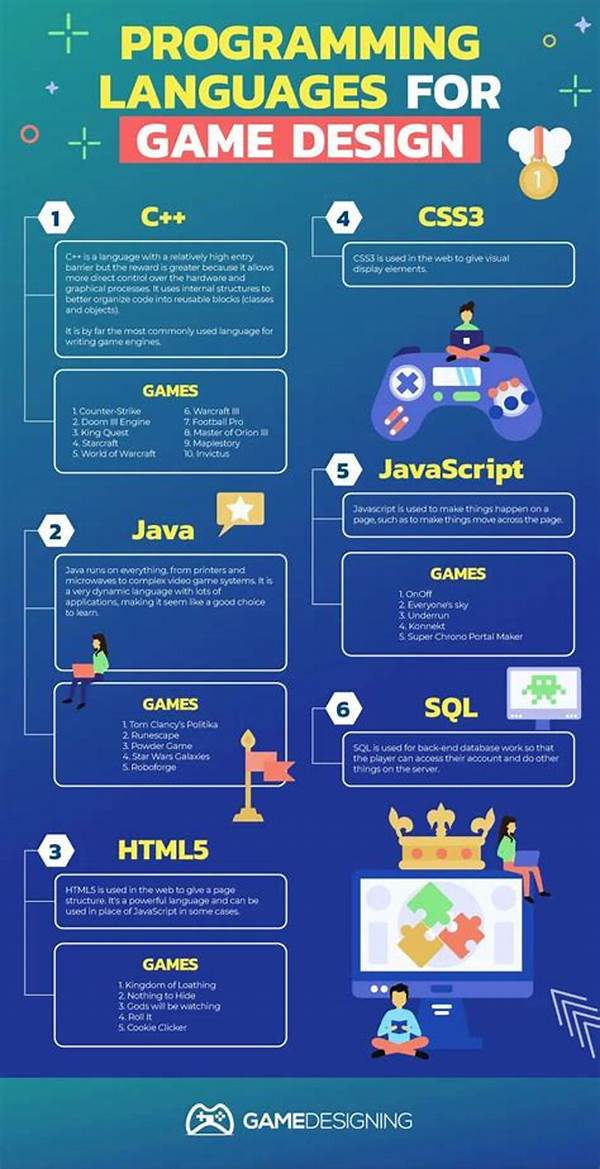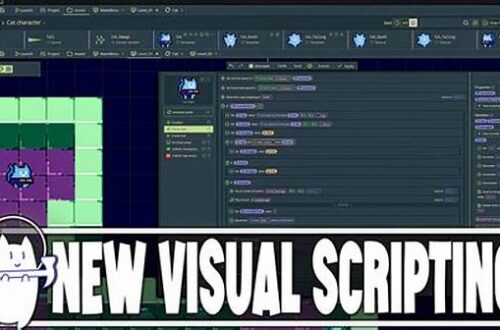Hey, fellow gamers and budding developers! Ever wondered what makes those epic games you love to play come to life? Well, behind every stunning graphic and intense battle scene lies some pretty cool tech magic. Yep, I’m talking about scripting languages for game development. Whether you’re dreaming of creating the next blockbuster or just curious about how things work, you’re in the right place. Let’s dive into the fascinating world of game scripting!
Read Now : Dynamics And Kinematics Modeling
Understanding Scripting Languages in Game Development
Alright, let’s break it down. Scripting languages for game development are essentially the codes and scripts that bring video games to life. They manage everything from character movements to game logic, making sure your game runs smoothly. Think of them as the unsung heroes in the gaming world—working backstage so the show goes on without a hitch. Imagine trying to play a game where the characters just stood there like statues. Thanks to scripting languages, they dance, run, jump, and maybe even take a nap occasionally. They’re what makes your gaming universe dynamic and interactive.
Now, you might be thinking, “Do I really need to know this if I just want to play games?” Well, understanding the basics can actually enhance your appreciation of the games you love. Plus, if you’re thinking about designing your own games, this knowledge is crucial. From industry giants like Unity and Unreal Engine, scripting languages help developers implement features without having to reinvent the wheel for every game. It’s all about efficiency and creativity rolled into one, allowing developers to focus on innovative game design rather than coding complexities.
Why Use Scripting Languages for Game Development?
Let’s get real about why scripting languages rule the game dev world.
1. Ease of Use: They’re generally easier to learn and use than traditional programming languages. Perfect for beginners!
2. Rapid Prototyping: Need to test a feature quickly? Scripting languages let you toss ideas around without the heavy lifting.
3. Flexibility: From character interactions to changing level designs, scripting languages offer developers the flexibility to modify game elements with ease.
4. Community Support: Big-name languages like Python or Lua have bustling communities ready to help out, whether you’re stuck or need a tip.
5. Integration with Game Engines: Many popular game engines support these languages, making the development process smooth and efficient. Unity with C#, Unreal with Blueprints—take your pick!
Popular Scripting Languages for Game Development
When it comes to scripting languages for game development, it’s all about picking the right tool for the job. Major players like Python, Lua, and C# are big in the industry. Python, with its easy-to-read syntax, is a beginner’s favorite, helping you code without the headache of complex structures. Lua, on the other hand, is lightweight and fast, making it the go-to for performance-critical elements in games. C# is particularly popular thanks to its integration with Unity. It strikes a balance between easy learning and powerful execution, allowing you to create compelling gameplay experiences.
Different games have different needs—so while these languages each have their strengths, the best fit often depends on your specific game project. Whether it’s simple mechanics or intricate AI behavior, choosing the right scripting language can significantly impact your game’s development and final feel. So, grab your metaphorical toolkit and choose wisely!
Advantages of Scripting Languages in Game Development
Let’s be honest—scripting languages for game development offer a boatload of advantages.
1. Boost in Productivity: Focusing on game design becomes a breeze when scripts handle the coding grunt work.
2. Dynamic Game Features: Developers can control game environments as the game plays—from changing weather to random events and more.
3. Low Barrier to Entry: Game creation doesn’t have to be rocket science. Thanks to simpler syntax, newbies can dive right in.
4. Support for Rapid Changes: Patching or updating a game? Scripting languages make post-launch tweaks a walk in the park, ensuring players get the best experience.
Read Now : **advanced Gamemaker Language Tutorials**
5. Team Collaboration: With scripts, multiple developers can work harmoniously on different elements of the game, keeping the project cohesive and on track.
6. Game Engine Compatibility: No stress about compatibility! Many scripting languages fit snugly with major engines out there.
7. Scalability: Designing games for scalability is essential in the modern digital age, and scripting languages facilitate this smoothly.
8. Efficient Memory Usage: They often manage memory automatically, helping keep your game’s performance sharp and efficient.
9. Cross-Platform Capabilities: Dreaming of a multi-platform launch? Scripting languages assist developers in creating games that work seamlessly across various devices.
10. Prototype to Final Product: Crafting a game concept into a full product? Scripts guide this transition efficiently without starting from scratch.
Exploring Scripting Language Features for Game Development
So, what exactly makes scripting languages for game development so special? One of the standout features is their ability to handle complex game logic with finesse. From controlling NPC behaviors to crafting intricate puzzles, scripting languages let developers breathe life into their creative visions. Take co-op multiplayer experiences, for instance. It’s great fun when players interact with a world where every action has a consequence, and scripting languages make it all possible.
Another nifty feature is modding support. Imagine being able to customize a game after launch—adding new levels, characters, or even entirely new story arcs. Many developers actively encourage their community to mod games because it brings a fresh layer of innovation and replayability. Using scripting languages, even the community can jump in and build upon a game’s existing framework, extending its longevity. Whether you’re a developer adding features or a player with a vision, these scripting goodies add a whole new dimension to game interactivity.
The Future of Scripting Languages in Gaming
As technology evolves, so do scripting languages for game development. Bigger, prettier, and more immersive games demand more versatile and powerful scripting tools. Languages are evolving to be more optimized, ensuring they keep pace with the cutting-edge graphics and complex simulations of tomorrow’s gaming worlds. Developers are finding new ways to integrate artificial intelligence, making non-playable characters hyper-realistic, adding depth to gameplay that we could only dream of in the past.
Another promising trend is the rise of machine learning integration in games. Imagine NPCs who learn and adapt from player actions. Scripting languages make this feasible by allowing AI to analyze data and tweak behaviors in real-time. Whether you’re new to the scene or a seasoned coder, keeping an eye on these evolving capabilities is a smart move. The future is bright and full of endless possibilities for both developers and gamers alike, ensuring that the coming years will be as exciting as ever in the realm of video game creation.
Wrapping Up the World of Scripting Languages for Game Development
And there you have it, folks! Scripting languages for game development might seem like a complex venture, but they hold the key to crafting memorable gaming experiences. They’re flexible, approachable, and backed by enthusiastic communities ready to assist game developers of all levels. Whether you’re aiming to craft a new world or enhance an existing one, scripting languages work as the backbone of your project, bringing designs to life and stories to the screen.
As you venture into game development or simply continue to enjoy the games crafted using these languages, remember that every jump, victory, and epic boss confrontation you experience has a well-written script behind it. From beginners taking their first steps to professionals perfecting their craft, the realm of game scripting is a dynamic and ever-evolving landscape. So dive in, explore, and maybe—just maybe—you’ll be the one crafting the next legendary game that gamers worldwide can’t stop talking about!





